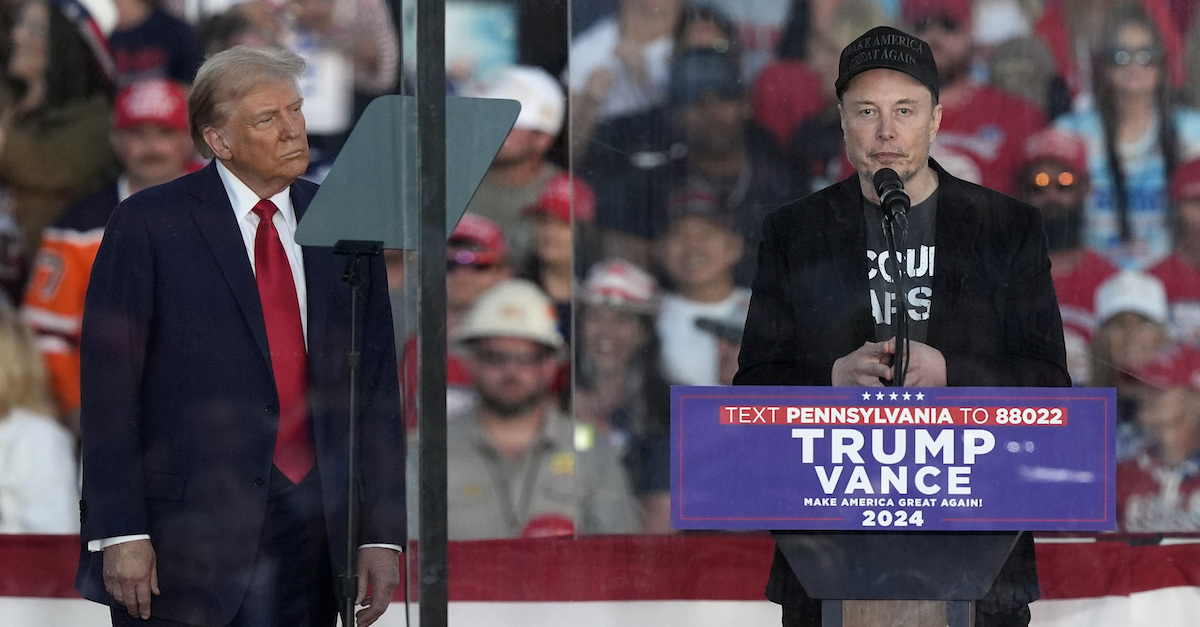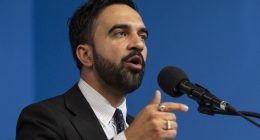
President Donald Trump listens as Elon Musk speaks during a campaign rally at the Butler Farm Show, Saturday, Oct. 5, 2024, in Butler, Pa. (AP Photo/Julia Demaree Nikhinson, File).
A federal judge expressed decided levels of unease with the transparency being provided by the Elon Musk-helmed Department of Government Efficiency (DOGE) during a hearing on Friday.
On Feb. 13, over two dozen pseudonymous current and former employees or contractors with the U.S. Agency for International Development (USAID) sued Musk, arguing his position violates the U.S. Constitution’s Appointments Clause and separation of powers.
This argument, filed in Maryland federal court, attacks the basic constitutional legitimacy of the cost-cutting organization with an iteration of the exact same argument that spelled doom for onetime special counsel Jack Smith in the Mar-a-Lago documents case. As Law&Crime previously reported, a similar lawsuit was filed on the same day by a coalition of 14 states in Washington, D.C. federal court.
Now, U.S. District Judge Theodore Chuang, a Barack Obama appointee, is one of many judges weighing if and how to grant the plaintiffs relief as DOGE comes under a sustained and varied barrage of legal complaints.
During the Friday hearing, the judge drilled down on a more basic issue about the makeup of the evasively-defined organization.
Much consternation – in various lawsuits filed against DOGE, Musk and the administration – has resulted from how, exactly, DOGE is being defined and under what authority the group operates. Part and parcel of this dispute is the fact that the former U.S. Digital Service was renamed the U.S. DOGE Service (USDS). At the same time, however, the administration has been cagey about whether or not this is the group of “special employees” that answers to Musk.
What is clear, now, but only after weeks of questions in lawsuit and during press briefings, is that the USDS administrator is Amy Gleason. Still, where or whether the twain, in fact, meet is an open question.
The judge, for his part, tried to get some answers.
“Who was the head of DOGE before Amy Gleason?” Chuang asked, according to a courtroom report by Anna Bower, the senior editor of Lawfare, a legal blog.
“I can’t answer that,” U.S. Department of Justice lawyer Joshua Gardner conceded. “I don’t know.”
The judge was not satisfied with the attorney’s response.
“I mean, that seems like a knowable fact, doesn’t it?” the jurist asked.
To which the government lawyer replied: “I’m sure it is knowable; I just don’t know it. I’m very conscious of being accurate with the court.”
The judge continued to pull on that thread.
“Have you asked anyone?” Chuang asked.
Gardner initially indicated he had not asked but immediately corrected himself.
“Actually, strike that,” the government lawyer went on. “I have asked previously, and I was not able to get answer [sic].”
Later on, the judge asked whether there was an administrator in place before Gleason – or whether she was the first. Again, the attorney was flummoxed.
“I’m not saying either,” Gardner replied. “Because I don’t know.”
The answers to those questions are likely key to the underlying case – where the plaintiffs allege an “attempted government takeover” by way of “an extraordinary amount of power” granted to Musk. This power, the lawsuit alleges, is in violation of the Appointments Clause because Musk was not appointed subject to the advice and consent of the Senate through the typical confirmation process.
“[E]ven if Defendant Musk could somehow be considered a mere ’employee’ rather than an ‘officer’ of the United States, his exercise of ‘significant,’ seemingly unfettered authority constitutes a grave violation of the separation-of-powers,” the lawsuit goes on.
As readers will recall, last summer, Chief Justice John Roberts and a majority of the justices issued a broad grant of presidential immunity to Trump; then, two weeks later, U.S. District Judge Aileen Cannon used a concurrence to that opinion by Thomas to squelch the special counsel’s authority and dismiss the documents case against Trump with a novel reading of the Appointments Clause – precisely because Smith himself exercised extreme power without Senate confirmation.
Musk’s actual status, therefore, is instrumental to the present lawsuit – in which he is the first-named defendant.
Love true crime? Sign up for our newsletter, The Law&Crime Docket, to get the latest real-life crime stories delivered right to your inbox.
The judge picked up on that on Friday.
“Is there a piece of paper, like, an appointment paper?” Chuang asked, according to Bower’s report. “Is there one that says Elon Musk, Senior Adviser to the President?”
The DOJ lawyer appeared to feign ignorance about the connection.
“Sorry, now you’re talking about Elon Musk, not the DOGE administrator?” Gardner asked.
The judge lectured, at length:
The plaintiffs are saying Musk was the head of DOGE. You’re saying he wasn’t, but we can’t tell you who was, which admittedly is highly suspicious…I’m not saying that you’re not being candid, but the whole operation raises questions. There’s an affidavit saying he’s a senior advisor of the president. But there’s a “strange disconnect” where he has referred to himself in public as affiliated with DOGE and not as a senior adviser to the president—until recently, after these lawsuits were filed. Having some backup documentation for that would seem to be useful.
Ultimately, the court declined to immediately rule on the plaintiffs’ motion for a preliminary injunction. The judge said he would take the matter under advisement.







